- APPS
- CRM Check List and Approval Process 15.0

| Technical name | crm_checklist |
| License | LGPL-3 |
| Website | https://faotools.com/apps/15.0/crm-check-list-and-approval-process-624 |
Making a customer from an opportunity is the only goal of the CRM pipeline. To achieve that goal sales staff needs to undertake a specific sequence of actions. Each of those actions is important on a definite funnel stage. Efficient companies know that missing of any step might result in a long-run failure. This is an Odoo tool to make sure such a failure will not happen. The app provides a check list for each pipeline stage to control requirements' fulfillment and to make sure that each action is fully approved by responsible users.
Stage-specific CRM checklists
Check lists are assigned per each opportunity stage. For instance, actions for the 'new' and 'proposition' stages might be different. Prepare any number of checkpoints for each CRM stage
Team-specific check points
Checklists might be optionally distinguished by sale teams. Thus, the set of actions per stage may be different for 'America' and 'Europe'
Actions ensured to be done
To move a CRM lead forward in your funnel, its check list should be fully confirmed ('moving forward' implies any change of stage from a lesser to a bigger sequence). For certain stages - e.g. for 'Canceled' - you may want to avoid such restriction. Then, mark this stage as 'No need for checklist'
Highlighted opportunity progress
Fulfillment progress is shown on opportunities kanban and form views for instant overview
Approval history for managerial control
Check list actions are saved in history. If an opportunity is moved back, already done check items would be recovered. Turn on the setting 'not saved' to avoid that behavior for specific approval points
Multiple CRM check list roles
The app lets assign security groups for each check list point. In such a case, only users from that groups would be able to confirm a related item
Forbid opportunity regress
With the tool, configure the CRM pipeline to disallow moving opportunities back. To that goal, turn on the option 'Forbid regress to this stage' for particular states. For example, to make sure no leads become 'New' again
Super approval admins
The special role 'CRM Checklists Super User' allows (a) to confirm any check points disregarding defined security groups; (b) to move any opportunity further (progress) without fulfilling check lists; (c) to move any opportunity back (regress) even a new stage does not allow that.
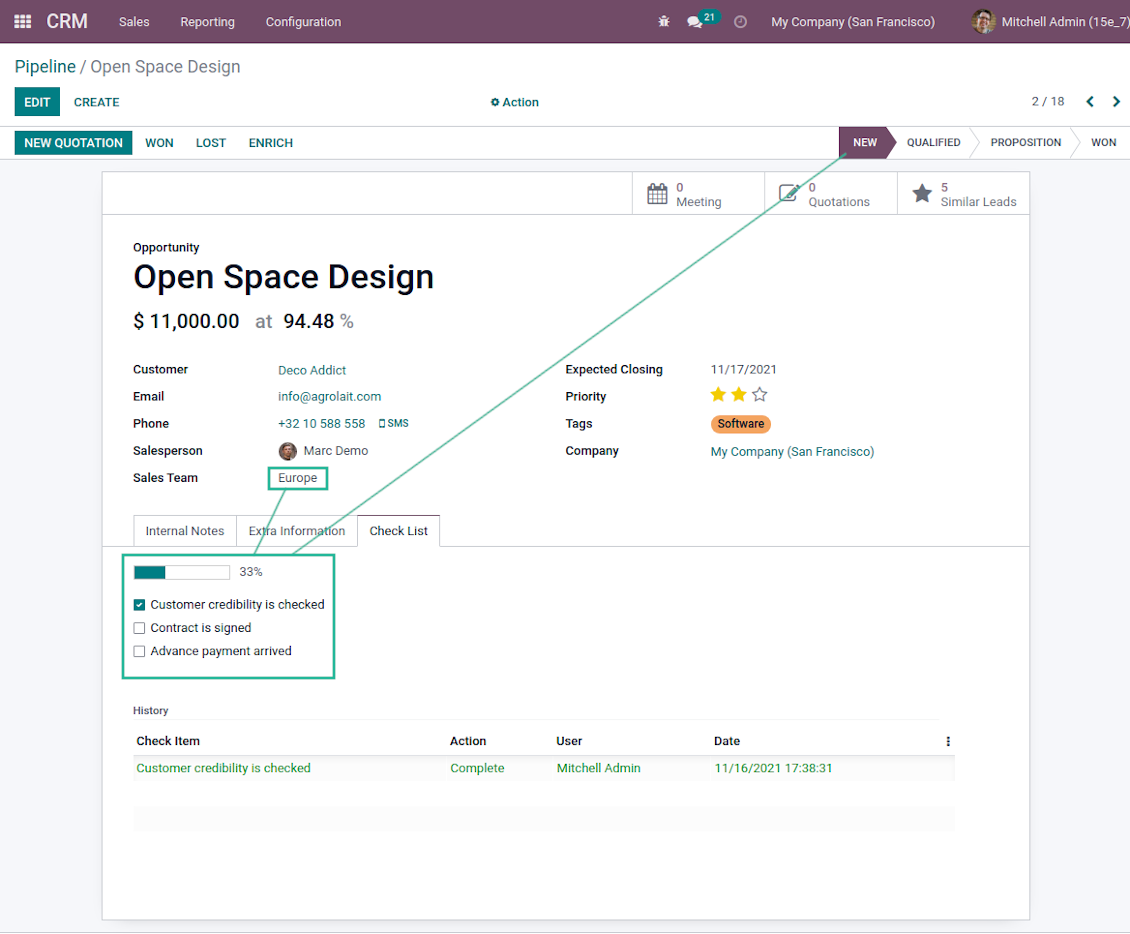

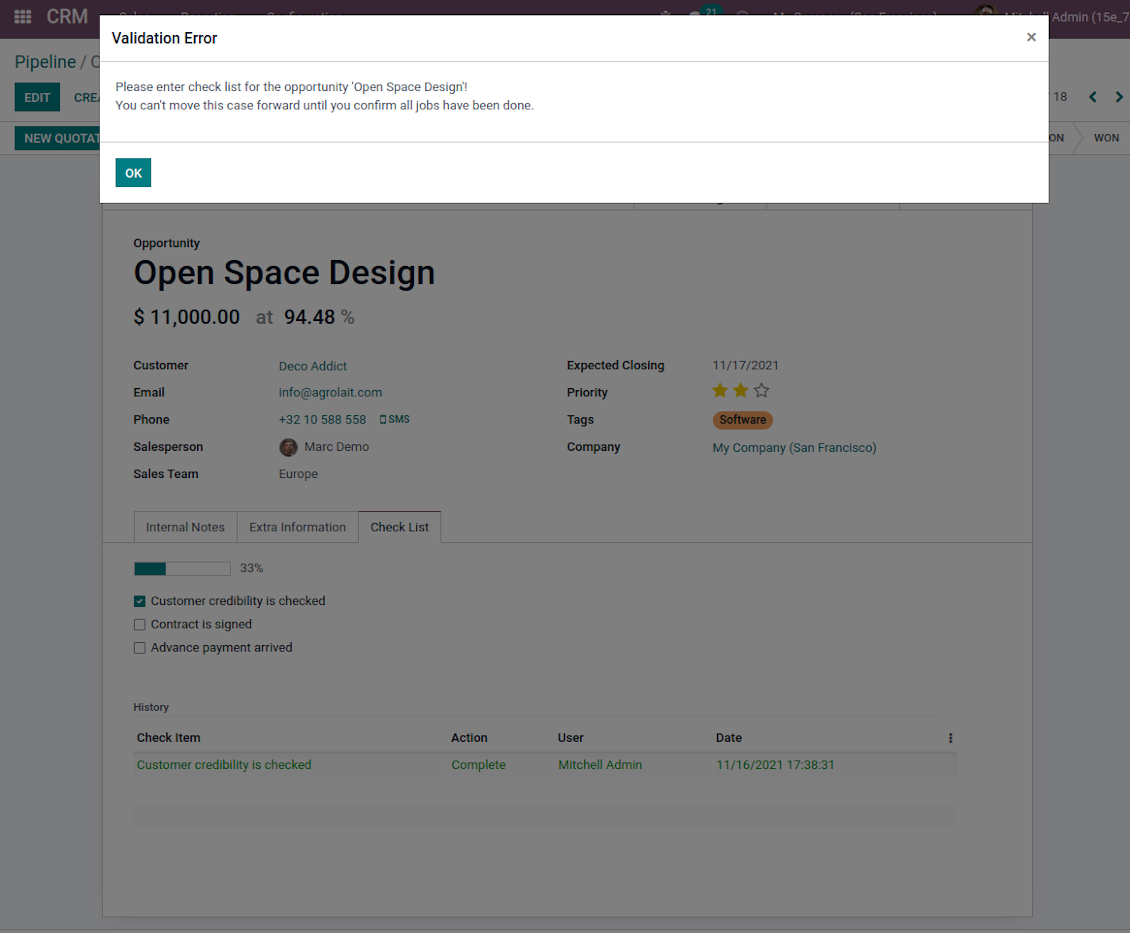
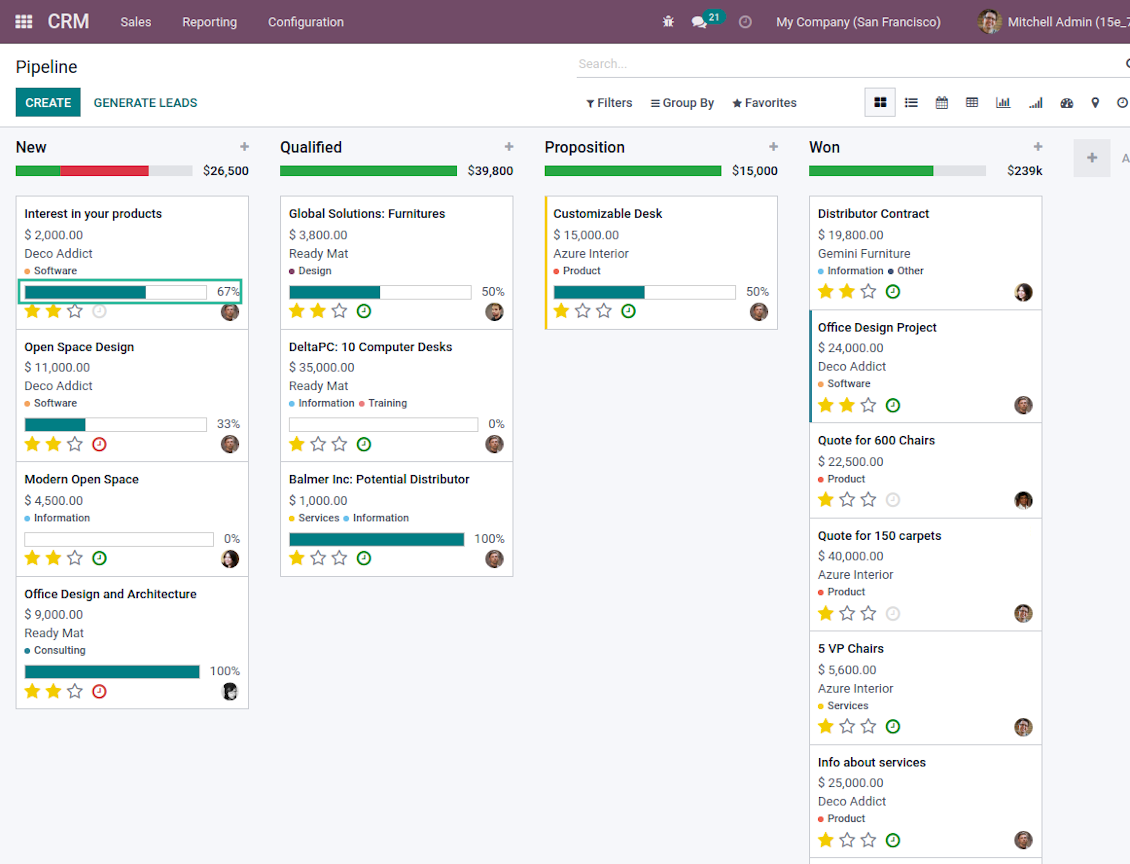
Anybody who has access to stage settings can modify the value of check lists.
If set to "true", a lead/opportunity might be moved to this stage without fulfilling a check list. Usually used for "lost" stage, since it doesn't require any sort of extra actions. In such a case users can move any lead/opportunity to "lost" from any stage without doing anything (e.g. new > lost, proposition > lost).
If set to "false", a checklist of a current stage is required to be entered if moved to this stage (in case it is further through the pipeline). For example, "won" state requires certain actions. If you move a lead/opportunity from "proposition" to "won", you should confirm check points of the "proposition" stage. "False" is the default value for "no need for checklist" field.
When making a checklist you can choose the user groups for each checklist's statement. Only these user groups will be able to mark the statement as done. If someone else tries to mark the statement done, then the system will not let them save it and the warning will appear.
According to the current Odoo Apps Store policies:
- every module bought for the version 12.0 and prior gives you an access to the all versions up to 12.0.
- starting from the version 13.0, every version of the module should be purchased separately.
- disregarding the version, purchasing a tool grants you a right for all updates and bug fixes within a major version.
Take into account that faOtools team does not control those policies. By all questions please contact the Odoo Apps Store representatives directly.
The easiest approach is to use the Odoo store built-in workflow:
1. Open the module's page and click the button Deploy on odoo.sh
2. After that, you will be redirected to the GitHub page. Login to your account and click 'Create a new repo' or use the existing one. Please, make sure, that your repository is private. It is not permitted to publish the apps under the OPL-1 license. If necessary, create a new repo for your Odoo.sh project
3. Then, go to odoo.sh and click on the deploy button, submit the decision in the pop-up window and click 'Continue'. The action will trigger the installation process.
These steps would install the app for your project production branch. If you wanted to deploy the apps for other branches or update the module, you should undertake the following actions:
1. Upload the source code for the app from the Odoo store
2. Commit the module to a required GitHub repository. Make sure that none of the app folders/files are ignored (included in the .gitignore of your repo). Repositories are automatically created by odoo.sh, which might add by default some crucial items there (e.g. /lib). You should upload all module directories, subdirectories, and files without exceptions
3. Deploy a target branch of the odoo.sh project or wait until it is automatically built if your settings assume that.
Unzip the source code of the purchased tools in one of your Odoo add-ons' directory
Re-start the Odoo server
Turn on the developer mode (technical settings)
Update the apps' list (the apps' menu)
Find the app and push the button 'Install'
Follow the guidelines on the app's page if those exist.
Yes, sure. Take into account that Odoo automatically adds all dependencies to a cart. You should exclude previously purchased tools.
A red/orange warning itself does not influence features of the app. Regretfully, sometimes our modules do not pass standard automatic tests, since the latter assumes behavior which is in conflict with our apps goals. For example, we change price calculation, while standard Odoo module tests compare final price to standard algorithm.
So, first of all, please check deployed database features. Does everything work correctly?
If you still assume that warning influences real features, please contact us and forward full installation logs and the full lists of deployed modules (including core and third party ones).
No, we distribute the tools only through the official Odoo apps store
Regretfully, we do not have a technical possibility to provide individual prices.
No, third party apps can not be used on Odoo Online.
Yes, all modules marked in dependencies are absolutely required for a correct work of our tool. Take into account that price marked on the app page already includes all necessary dependencies.
The price for our modules is set up in euros. The Odoo store converts prices in others currencies according to its internal exchange rate. Thus, the price in US Dollars may change, when exchange rate changes.
Opportunity check list per stages

Opportunity stage check lists

Check list to be confirmed before going further

Approval process distributed by various user roles
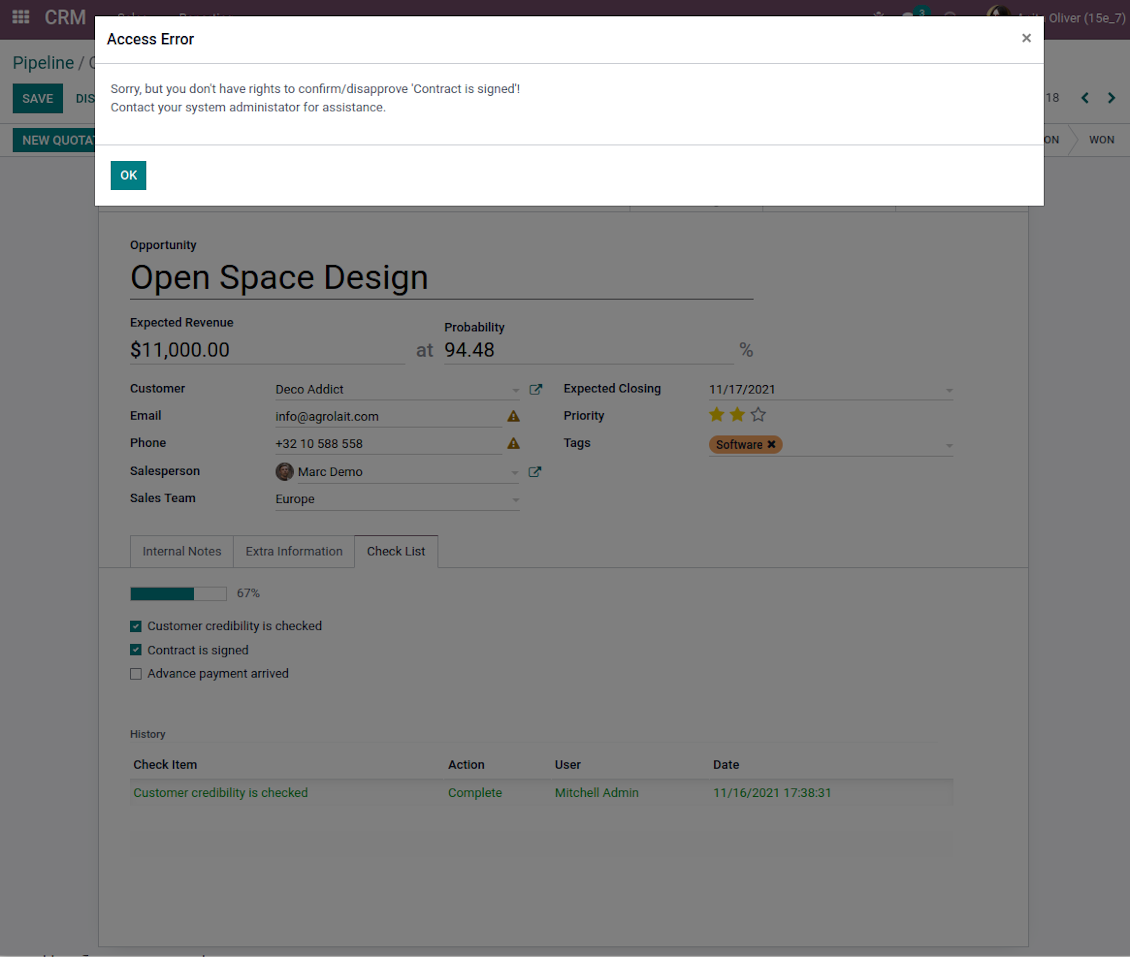
Opportunities check list progress kanban view

Optionally forbid opportunity regress
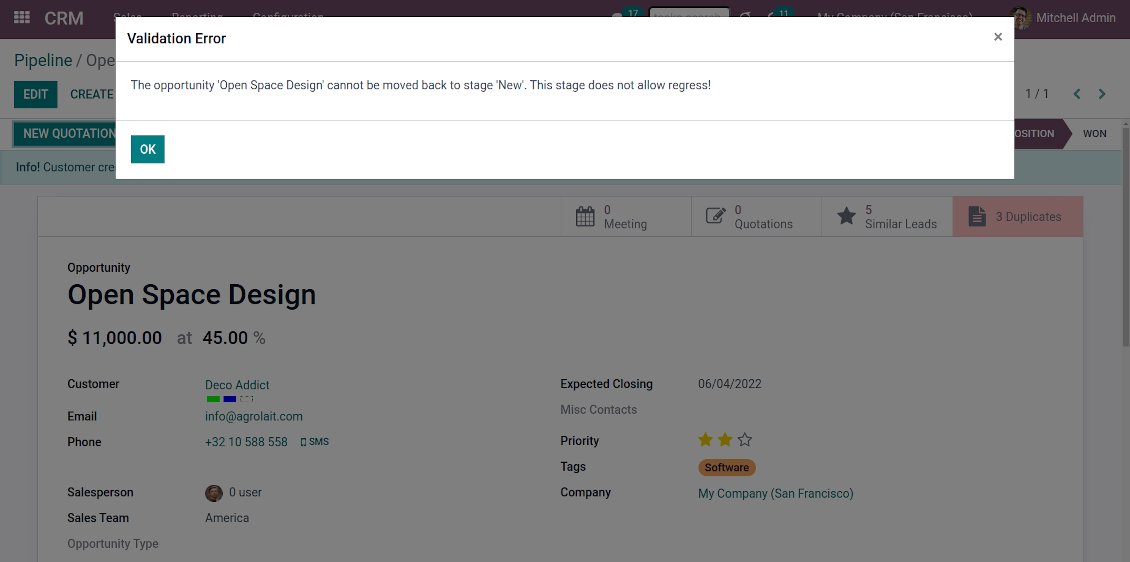
Opportunity check list tree view
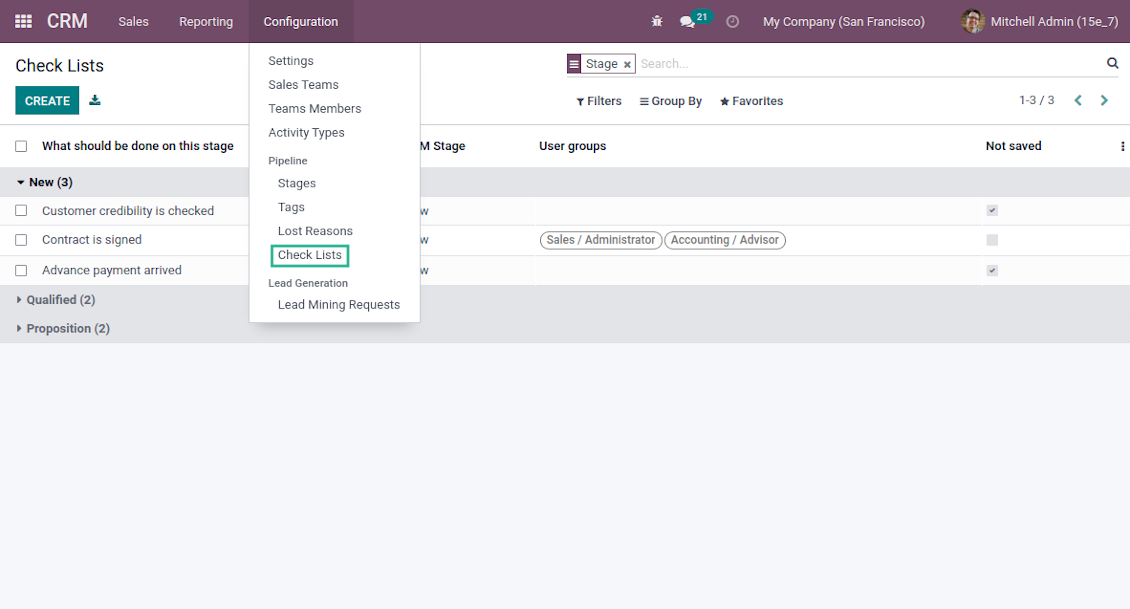
The super rights to approve any check items and move opportunities
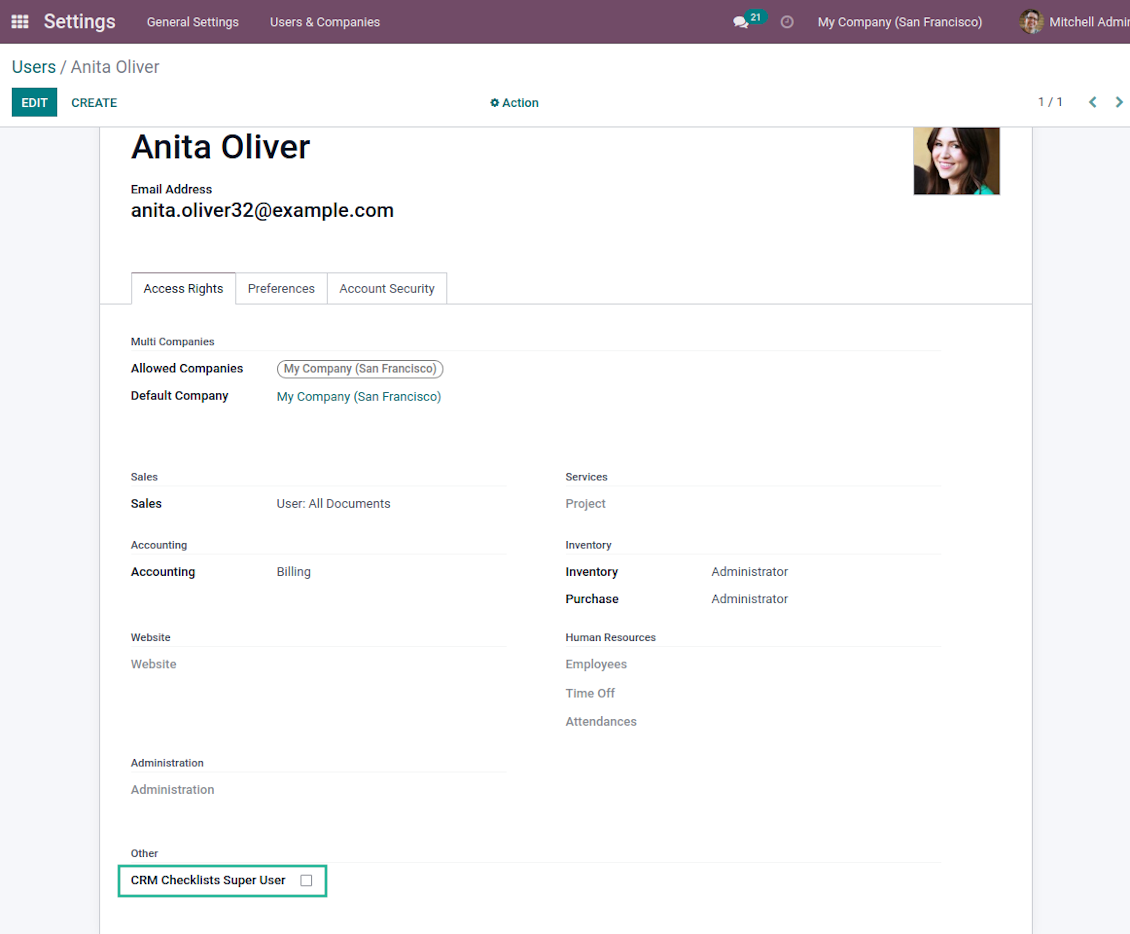
Odoo demonstration databases (live previews)
For this app, we might provide a free personalized demo database.
To demand such a database, press the button "Live Preview" on the top of this page or copy the link https://faotools.com/s/rhajsc
No phone number or credit card is required to contact us: only a short email sign up which does not take more than 30 seconds.
By your request, we will prepare an individual live preview database, where you would be able to apply any tests and check assumptions for 14 days.
Bug reporting
In case you have faced any bugs or inconsistent behavior, do not hesitate to contact us. We guarantee to provide fixes within 60 days after the purchase, while even after this period we are strongly interested to improve our tools.
To send us a bug report: press the "Website" link on the top of this page and push the button "Bug Report" (the tab Support). Alternatively, copy the link https://faotools.com/s/anbad8
No phone number or credit card is required to contact us: only a short email sign up which does not take more than 30 seconds.
Please include in your request as many details as possible: screenshots, Odoo server logs, a full description of how to reproduce your problem, and so on. Usually, it takes a few business days to prepare a working plan for an issue (if a bug is confirmed) or provide you with guidelines on what should be done (otherwise).
Public features requests and module ideas (free development)
We are strongly motivated to improve our tools and would be grateful for any sort of feedback. In case your requirements are of public use and might be efficiently implemented, the team would include those in our to-do list.
Such a to-do list is processed on a regular basis and does not assume extra fees. Although we cannot promise deadlines and final design, it might be a good way to get desired features without investments and risks.
To share ideas: press the "Website" link on the top of this page and push the button "Share Features Ideas" (the tab Support). Alternatively, copy the link https://faotools.com/s/n1zkso
No phone number or credit card is required to contact us: only a short email sign up which does not take more than 30 seconds.
Questions and misc issues
Feel free to contact us with any other concerns, doubts, or questions: press the "Website" link on the top of this page and push the button "Raise Question" (the tab Support). Alternatively, copy the link https://faotools.com/s/q7xpaf
About the team
faOtools (faotools.com, former odootools.com) is the team of developers and business analysts to help you extend Odoo's potential. We have been communicating with end users to whom the software became the main business tool since 2012. As a result, we are proud of dozens of successful Odoo apps developed. We are open for new ideas and challenges to create the best Odoo apps for business needs all over the world.
You may like the tools
The tool to build deep and structured knowledge base for internal and external use. Knowledge System. KMS. Wiki-like revisions
298The tool to flexibly structure Odoo attachments in folders and synchronize directories with cloud clients: Google Drive, OneDrive/SharePoint, Nextcloud/ownCloud, Dropbox. DMS. File Manager. Document management system.
245The tool for time-based service management from booking appointments to sales and reviews
399The tool to safely keep passwords in Odoo for shared use. Shared vaults. Encryption
188The tool to automatically synchronize Odoo attachments with OneDrive files in both ways
394The tool to calculate sale trends and make prediction for future sales statistically. Sales Forecast. Sales prediction
198The tool to add new fields for Odoo CRM opportunities without any technical knowledge
38The tool for real-time control of customers' and opportunities' duplicates
The tool to keep complete and easy-reach opportunities' contact information
This is an unofficial translation of the GNU Lesser General Public License into Vietnamese. It was not published by the Free Software Foundation,
and does not legally state the distribution terms for software that uses the GNU LGPL - only the original English text of the GNU LGPL does
that. However, we hope that this translation will help language speakers understand the GNU LGPL better.
GNU LESSER GENERAL PUBLIC LICENSE
Version 3, 29 June
2007
Copyright (C) 2007 Free Software Foundation, Inc. <https://fsf.org/>
Everyone is permitted to copy and distribute verbatim copies of this license document, but changing it is not allowed.
This version of the GNU Lesser General Public License incorporates the terms and conditions of version 3 of the GNU General Public License,
supplemented by the additional permissions listed below.
0. Additional Definitions.
As used herein,"this License" refers to version 3 of the GNU Lesser General Public License, and the "GNU GPL" refers to version 3 of
the GNU "General" Public License.
"The Library" refers to a covered work governed by this License, other than an Application or a Combined Work as defined below.
An "Application" is any work that makes use of an interface provided by the Library, but which is not otherwise based on the Library.
Defining a subclass of a class defined by the Library is deemed a mode of using an interface provided by the Library.
A "Combined Work" is a work produced by combining or linking an Application with the Library. The particular version of the Library
with which the Combined Work was made is also called the "Linked Version".
The "Minimal Corresponding Source" for a Combined Work means the Corresponding Source for the Combined Work, excluding any source code
for portions of the Combined Work that, considered in isolation, are based on the Application, and not on the Linked Version.
The "Corresponding Application Code" for a Combined Work means the object code and/or source code for the Application, including any data
and utility programs needed for reproducing the Combined Work from the Application, but excluding the System Libraries of the Combined Work.
1. Exception to Section 3 of the GNU GPL.
You may convey a covered work under sections 3 and 4 of this License without being bound by section 3 of the GNU GPL.
2. Conveying Modified Versions.
If you modify a copy of the Library, and, in your modifications, a facility refers to a function or data to be supplied by an Application that
uses the facility (other than as an argument passed when the facility is invoked), then you may convey a copy of the modified version:
a) under this License, provided that you make a good faith effort to ensure that, in the event an Application does not supply the function or data, the facility still
operates, and performs whatever part of its purpose remains meaningful, or
b) under the GNU GPL, with none of the additional permissions of this License applicable to that copy.
3. Object Code Incorporating Material from Library Header Files.
The object code form of an Application may incorporate material from a header file that is part of the Library. You may convey such
object code under terms of your choice, provided that, if the incorporated material is not limited to numerical parameters, data structure
layouts and accessors, or small macros, inline functions and templates (ten or fewer lines in length), you do both of the following:
a) Give prominent notice with each copy of the object code that the Library is used in it and that the Library and its use are covered by this License.
b) Accompany the object code with a copy of the GNU GPL and this license document.
4. Combined Works.
You may convey a Combined Work under terms of your choice that, taken together, effectively do not restrict modification of the portions of the
Library contained in the Combined Work and reverse engineering for debugging such modifications, if you also do each of the following:
a) Give prominent notice with each copy of the Combined Work that the Library is used in it and that the Library and its use are covered by this License.
b) Accompany the Combined Work with a copy of the GNU GPL and this license document.
c) For a Combined Work that displays copyright notices during execution, include the copyright notice for the Library among these notices,
as well as a reference directing the user to the copies of the GNU GPL and this license document.
d) Do one of the following:
0) Convey the Minimal Corresponding Source under the terms of this License, and the Corresponding Application Code in a form suitable for, and
under terms that permit, the user to recombine or relink the Application with a modified version of the Linked Version to produce a modified
Combined Work, in the manner specified by section 6 of the GNU GPL for conveying Corresponding Source.
1) Use a suitable shared library mechanism for linking with the Library. A suitable mechanism is one that (a) uses at run time a copy of the
Library already present on the user's computer system, and (b) will operate properly with a modified version of the Library
that is interface-compatible with the Linked Version.
e) Provide Installation Information, but only if you would otherwise be required to provide such information under section 6 of the
GNU GPL, and only to the extent that such information is necessary to install and execute a modified version of the Combined Work produced by
recombining or relinking the Application with a modified version of the Linked Version. (If you use option 4d0, the Installation Information
must accompany the Minimal Corresponding Source and Corresponding Application Code. If you use option 4d1, you must provide the Installation
Information in the manner specified by section 6 of the GNU GPL for conveying Corresponding Source.)
5. Combined Libraries.
You may place library facilities that are a work based on the Library side by side in a single library together with other library facilities that
are not Applications and are not covered by this License, and convey such a combined library under terms of your choice, if you do both of
the following:
a)Accompany the combined library with a copy of the same work based on the Library, uncombined with any other library facilities,
conveyed under the terms of this License.
b) Give prominent notice with the combined library that part of it is a work based on the Library, and explaining where to find the accompanying
uncombined form of the same work.
6. Revised Versions of the GNU Lesser General Public License.
The Free Software Foundation may publish revised and/or new versions of the GNU Lesser General Public License from time to time. Such new
versions will be similar in spirit to the present version, but may differ in detail to address new problems or concerns.
Each version is given a distinguishing version number. If the Library as you received it specifies that a certain numbered
version of the GNU Lesser General Public License "or any later version" applies to it, you have the option of following the terms and
conditions either of that published version or of any later version published by the Free Software Foundation. If the Library as you
received it does not specify a version number of the GNU Lesser General Public License, you may choose any version of the GNU Lesser
General Public License ever published by the Free Software Foundation.
If the Library as you received it specifies that a proxy can decide whether future versions of the GNU Lesser General Public License shall
apply, that proxy's public statement of acceptance of any version is permanent authorization for you to choose that version for the Library.